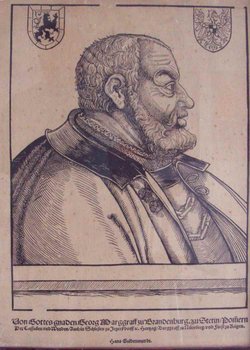He was a Margrave of Brandenburg-Ansbach from the House of Hohenzollern. He was born in Ansbach, the third of eight sons of Margrave Frederick the Elder and his wife Sophia of Poland, daughter of Casimir IV of Poland and Elisabeth of Habsburg.
The first reformatory writings began the work of winning him over to the evangelical cause. Martin Luther's powerful testimony of faith at the Diet of Worms in 1521 made an indelible impression upon his mind, and the vigorous sermons of evangelical preachers in the pulpits of St. Lawrence and St. Sebald in Nuremberg, during the diet there in 1522, deepened the impression. The study of Luther's translation of the New Testament, which appeared in 1522, established his faith on personal conviction. Moreover, he entered into correspondence with Luther, discussing with him the most important problems of faith, and in 1524 he met him personally during the negotiations concerning his brother Albert's secularization of the Teutonic Order's state of Prussia into the secular Duchy of Prussia.
He was a Margrave of Brandenburg-Ansbach from the House of Hohenzollern. He was born in Ansbach, the third of eight sons of Margrave Frederick the Elder and his wife Sophia of Poland, daughter of Casimir IV of Poland and Elisabeth of Habsburg.
The first reformatory writings began the work of winning him over to the evangelical cause. Martin Luther's powerful testimony of faith at the Diet of Worms in 1521 made an indelible impression upon his mind, and the vigorous sermons of evangelical preachers in the pulpits of St. Lawrence and St. Sebald in Nuremberg, during the diet there in 1522, deepened the impression. The study of Luther's translation of the New Testament, which appeared in 1522, established his faith on personal conviction. Moreover, he entered into correspondence with Luther, discussing with him the most important problems of faith, and in 1524 he met him personally during the negotiations concerning his brother Albert's secularization of the Teutonic Order's state of Prussia into the secular Duchy of Prussia.
Family Members
-
![]()
Kasimir von Brandenburg-Kulmbach
1481–1527
-
Barbara von Brandenburg-Ansbach-Kulmbach
1488–1490
-
![]()
Albrecht von Brandenburg-Ansbach
1490–1568
-
Johann von Brandenburg-Ansbach
1493–1525
-
Elisabeth von Brandenburg-Ansbach
1494–1518
-
Johann Albrecht von Brandenburg-Ansbach-Kulmbach
1499–1550
-
Friedrich Albrecht von Brandenburg-Ansbach
1501–1504
Advertisement
Explore more
Sponsored by Ancestry
Advertisement











